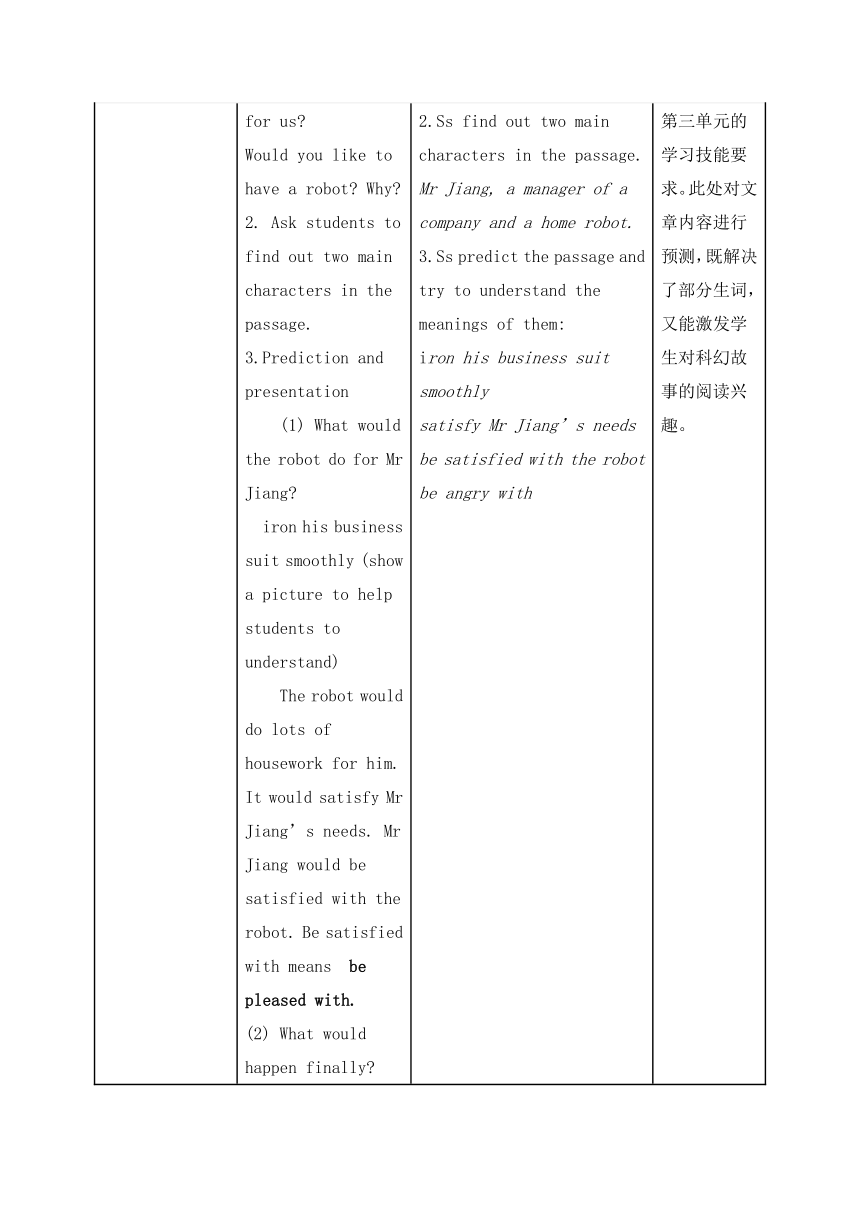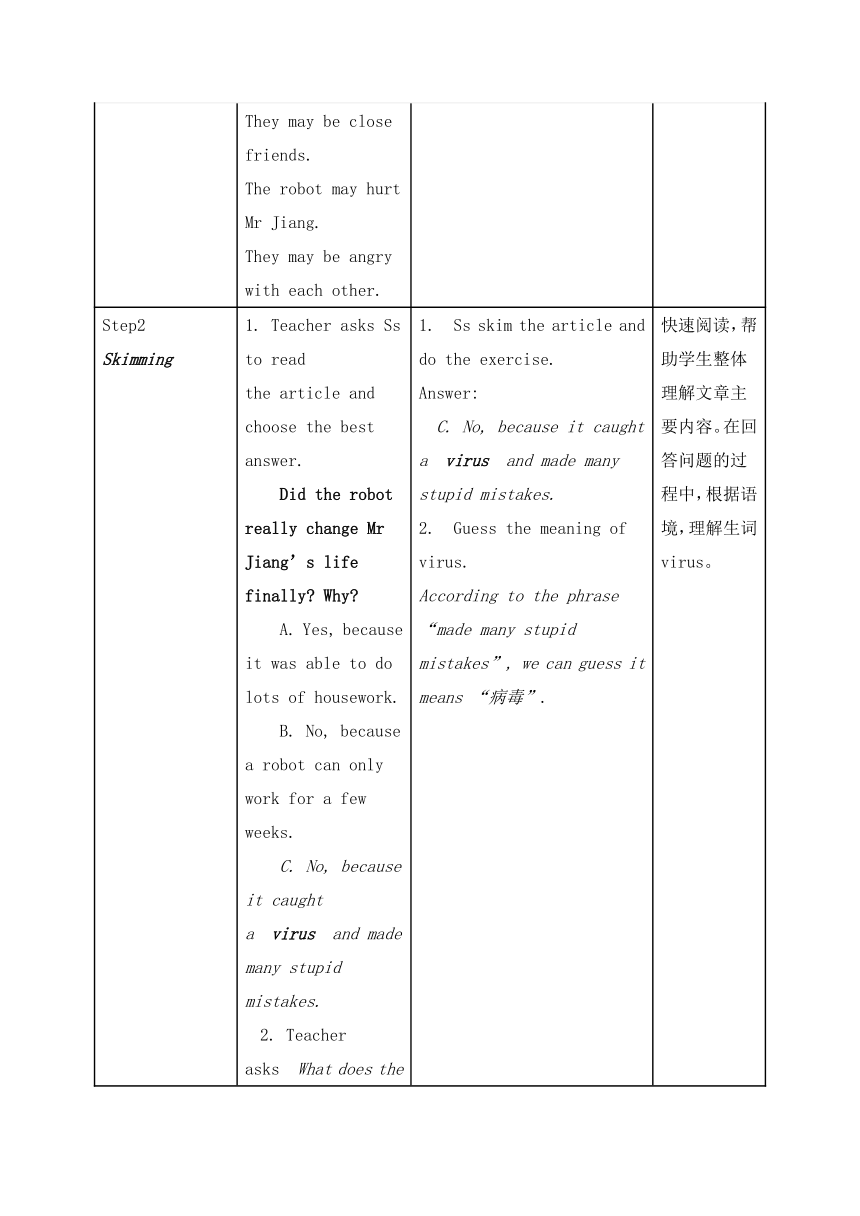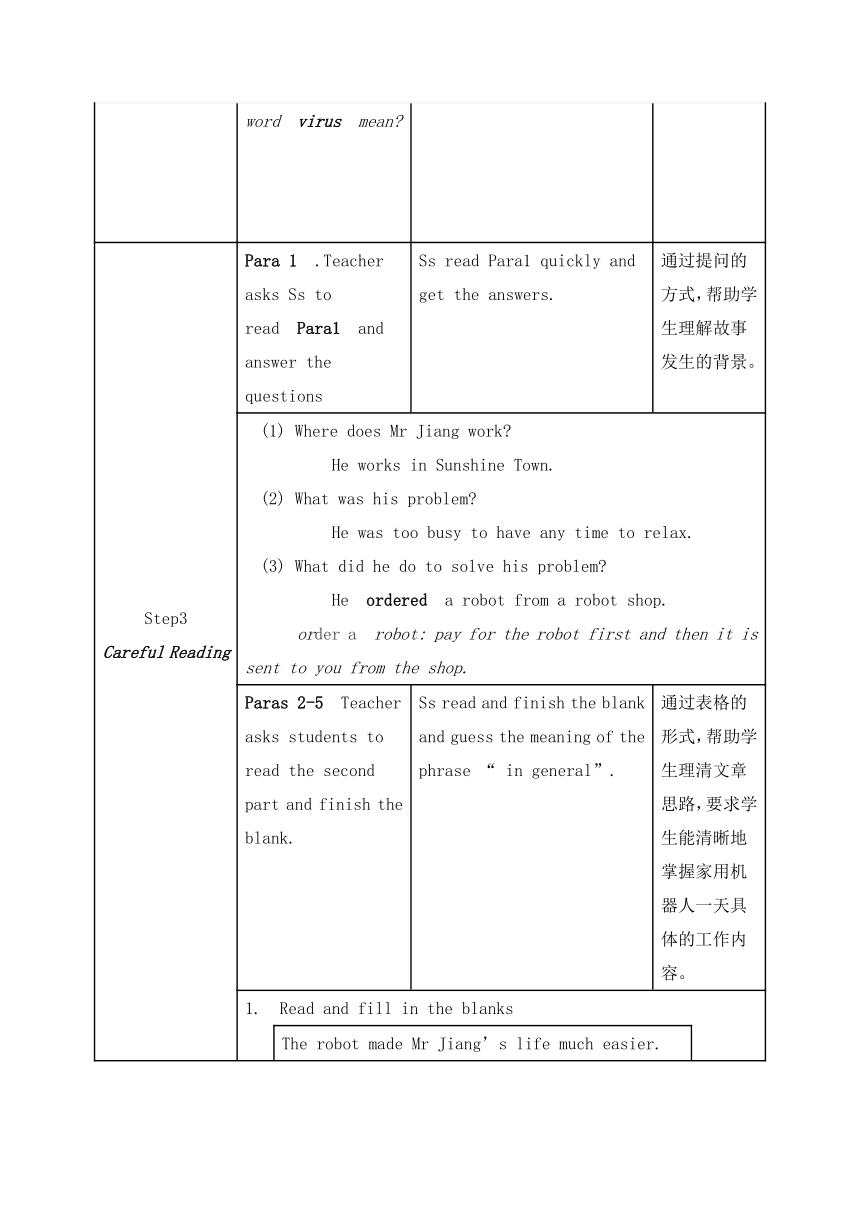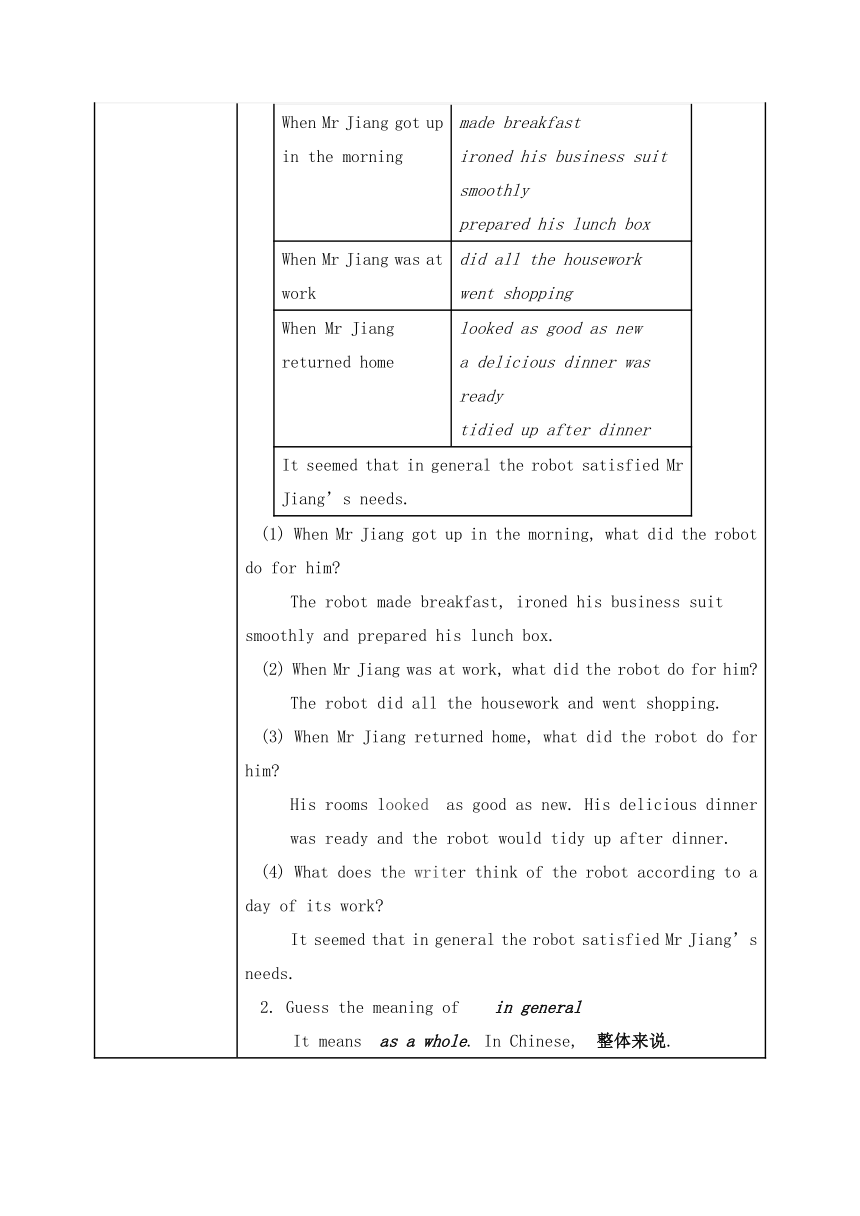牛津译林版九年级下Unit 3 Robot Reading1教案
文档属性
| 名称 | 牛津译林版九年级下Unit 3 Robot Reading1教案 |

|
|
| 格式 | zip | ||
| 文件大小 | 15.1KB | ||
| 资源类型 | 教案 | ||
| 版本资源 | 牛津译林版 | ||
| 科目 | 英语 | ||
| 更新时间 | 2019-04-27 00:00:00 | ||
图片预览





文档简介
9BUnit3 Teaching Plan
?Period2
Reading1
?
?
Teaching contents
1.???????Guess the meaning of some new words and phrases by context: virus, smoothly, order,satisfy, in a mess, in general..
2.???????Get the main idea of the passage by skimming and some important information by scanning, detailed reading.
Teaching method
ww-2-1-cnjy-cTask-based method
Teaching objectives
By the end of the lesson, students should be able to:www-2-1-cnjy-com
1. have a better understanding of robots;.
2. guess the meanings of the new words from the context;
3. understand the structure of the context;
4.catch the main idea of each part.
Teaching importance
Get the main idea of each paragraph and the passage.
Teaching difficulty
1.How to get the main idea of the article without reading it word by word.
2.Help students understand the meanings of the new words and phrases.
?
Teaching aids
CAI
Teaching procedures
Teacher’s activities
Students’ activities
Design intent
Step 1
Revision and Lead-in
?1.Ask two questions
What can a robot do for us?
Would you like to have a robot? Why?
2. Ask students to find out two main characters in the passage.
3.Prediction and presentation
??(1) What would the robot do for Mr Jiang?
?iron his business suit smoothly (show a picture to help students to understand)
??The robot would do lots of housework for him. It would satisfy Mr Jiang’s needs. Mr Jiang would be satisfied with the robot. Be satisfied with means?be pleased with.
(2) What would happen finally?
They may be close friends.
The robot may hurt Mr Jiang.
They may be angry with each other.
1.Ss answer the two questions by thinking by themselves.
2.Ss find out two main characters in the passage.
Mr Jiang, a manager of a company and a home robot.
3.Ss predict the passage and try to understand the meanings of them:
iron his business suit smoothly
satisfy Mr Jiang’s needs
be satisfied with the robot
be angry with
?
?
?
学会预测文章的内容是九年级上册第三单元的学习技能要求。此处对文章内容进行预测,既解决了部分生词,又能激发学生对科幻故事的阅读兴趣。
Step2
Skimming
1. Teacher asks Ss to read
the article and choose the best answer.
??Did the robot really change Mr Jiang’s life finally? Why?
??A. Yes, because it was able to do lots of housework.
??B. No, because a robot can only work for a few weeks.
??C. No, because it caught a?virus?and made many stupid mistakes.
2. Teacher asks?What does the word?virus?mean?
1.?Ss skim the article and do the exercise.
Answer:
?C. No, because it caught a?virus?and made many stupid mistakes.
2.?Guess the meaning of virus.
According to the phrase “made many stupid mistakes”, we can guess it means “病毒”.
?
?
快速阅读,帮助学生整体理解文章主要内容。在回答问题的过程中,根据语境,理解生词virus。
?
Step3
Careful Reading
?
Para 1?.Teacher asks Ss to read?Para1?and answer the questions
Ss read Para1 quickly and get the answers.
通过提问的方式,帮助学生理解故事发生的背景。
(1) Where does Mr Jiang work??
?????He works in Sunshine Town.
(2) What was his problem?
?????He was too busy to have any time to relax.
(3) What did he do to solve his problem?
?????He?ordered?a robot from a robot shop.
???order a?robot: pay for the robot first and then it is sent to you from the shop.
Paras 2-5?Teacher asks students to read the second part and finish the blank.
Ss read and finish the blank and guess the meaning of the phrase “ in general”.
通过表格的形式,帮助学生理清文章思路,要求学生能清晰地掌握家用机器人一天具体的工作内容。
1.?Read and fill in the blanks
The robot made Mr Jiang’s life much easier.
When Mr Jiang got up in the morning
made breakfast
ironed his business suit smoothly
prepared his lunch box
When Mr Jiang was at work
did all the housework
went shopping
When Mr Jiang returned home
looked as good as new
a delicious dinner was ready
tidied up after dinner
It seemed that in general the robot satisfied Mr Jiang’s needs.
(1) When Mr Jiang got up in the morning, what did the robot do for him?
The robot made breakfast, ironed his business suit smoothly and prepared his lunch box.
(2) When Mr Jiang was at work, what did the robot do for him?
The robot did all the housework and went shopping.
(3) When Mr Jiang returned home, what did the robot do for him?
His rooms looked?as good as new. His delicious dinner was ready and the robot would tidy up after dinner.
(4) What does the writer think of the robot according to a day of its work?
It seemed that in general the robot satisfied Mr Jiang’s needs.
2. Guess the meaning of??in general
?It means?as a whole. In Chinese,?整体来说.
Step3
Careful Reading
?
Para 6?Introduce what happened to the robot and Mr Jiang according to the pictures and questions.
?
Ss read Para6 and guess the meaning of the word “mess, spread” and the phrase “ in a mess”.
本小节生词特别多,为了培养学生在所给的故事情节中猜词语意的习惯,通过设问、追问、给图片的方式,带领学生在阅读中理解生词意思,在理解生词的基础上,理清文章思路。
1.?Introduce what happened to the robot and Mr Jiang according to the pictures and questions.
(1) But things started to go wrong. The robot caught a virus.?So what happened to it?
??It no longer worked properly.
(2)?What did the robot do in the morning?
??In the morning, it woke up Mr Jiang at 4 o’clock.
(3)?When Mr Jiang returned home, what did he find?
??He found his flat in a complete mess.
2. What does the?word?mess?mean??Is it a good condition or a bad condition?
??(1) What was on the bed?
?????The food?would?be laid?on the bed.?Lay?the food on the bed. “Lay” means “put”.
??(2) What was in the rubbish bin?
?????Milk would?be stored?in the rubbish bin.?Store?milk in the rubbish bin. “Store”?means “keep”.
??(3) What was all over the floor?
????Coins,?bills?and private papers?were spread?on the floor.?Spread?these things all over the floor. Here “spread”?means “put something everywhere”.
?????So what does the phrase?in a mess?mean?
It means?in a bad condition?or?not tidy at all.
Para 7?1. Teacher asks Ss to read and answer questions.
2.Ask Ss to think about?Which English saying can be used to describe his life ?
?
1.Ss read Para7 and answer the questions.
2.Think about the English saying.
Which English saying can be used to describe his life ?
?A.?Pride goes before a fall.
?B. Accidents will happen.
?C. Every bad has some good.
?D. You never know till you have tried.
?The answer: B.?天有不测风云.
第一、第二个问题在文章最后一小节能找到。但第三个问题是开放性问题,需要学生自己去思考,目的是引导学生思考机器人在人类生活中的地位。并且拓展所学引导学生学会联想。
?
1.What did Mr Jiang do with his robot?
He decided to return the robot to the robot shop.
?How does the writer feel about having a robot?
He thinks that robots can help people do a lot, but they can also be too much trouble!
Do you agree with the writer? Why?
?Step4?Production
1. Teacher gives Ss two questions and make them think carefully.
(1) How did Mr Jiang feel with his robot from beginning to the end???
(2) If you were Mr Jiang, what would you do?
2.?Ask them to design their own robots.
??(1) Design your own robot.
(2) What do you want your robot to do for you?
(3) What will you do for your robot?
1.?Ss think carefully and talk about them with their partners.
Answer: hopeful?→??satisfied???→ angry??→ disappointed
?
2. Work in groups and design their own robots.
?
在学生理解课文的基础上,引导他们进行更为深入的思考。并把自己的生活与机器人相联系,激发他们的想象力和创造力。
?
Step5
Class exercise
首字母填空
Robot?scientists are?not just trying to make robots look like people. For example, there are already robots w____1____in factories.?These robots look more like h____2____?arms.?They do s____3____?jobs over and over again.?People would not like to do such jobs and would get b____4____. But robots will never get bored. In the future, there will be more robots e____5____, and humans will have l____6____?work to do. New robots will have many different s____7____. Some will look like humans, and others?might look like snakes. After an earthquake, a snake robot could help look for people under b___8_____. That may not seem possible now, but computers, space rockets and even electric toothbrushes seemed??i?____9___?a hundred years ago.?We never know what will h____10____?in the future.
1________?2.________????3.________????4________????5.________
6.________7.________???8.________????9.________???10.________
Keys:
1.working 2.huge 3.simple 4.bored 5.everywhere 6.less 7.shapes 8.buildings 9.impossible 10.happen
?
Step6?Homework
1.?Read the?whole?article again and write down your own understanding of the robot.
2.?Surf the internet find out out some films about robots tell your desk-mates what the robots do in the films
??Terminator????Iron Man????Transformers
3.?Read?《9B英语读本》P38 and finish the exercises.
?
Teaching reflection
?
?
?
?
?
?
?
?
?
?
?
?Period2
Reading1
?
?
Teaching contents
1.???????Guess the meaning of some new words and phrases by context: virus, smoothly, order,satisfy, in a mess, in general..
2.???????Get the main idea of the passage by skimming and some important information by scanning, detailed reading.
Teaching method
ww-2-1-cnjy-cTask-based method
Teaching objectives
By the end of the lesson, students should be able to:www-2-1-cnjy-com
1. have a better understanding of robots;.
2. guess the meanings of the new words from the context;
3. understand the structure of the context;
4.catch the main idea of each part.
Teaching importance
Get the main idea of each paragraph and the passage.
Teaching difficulty
1.How to get the main idea of the article without reading it word by word.
2.Help students understand the meanings of the new words and phrases.
?
Teaching aids
CAI
Teaching procedures
Teacher’s activities
Students’ activities
Design intent
Step 1
Revision and Lead-in
?1.Ask two questions
What can a robot do for us?
Would you like to have a robot? Why?
2. Ask students to find out two main characters in the passage.
3.Prediction and presentation
??(1) What would the robot do for Mr Jiang?
?iron his business suit smoothly (show a picture to help students to understand)
??The robot would do lots of housework for him. It would satisfy Mr Jiang’s needs. Mr Jiang would be satisfied with the robot. Be satisfied with means?be pleased with.
(2) What would happen finally?
They may be close friends.
The robot may hurt Mr Jiang.
They may be angry with each other.
1.Ss answer the two questions by thinking by themselves.
2.Ss find out two main characters in the passage.
Mr Jiang, a manager of a company and a home robot.
3.Ss predict the passage and try to understand the meanings of them:
iron his business suit smoothly
satisfy Mr Jiang’s needs
be satisfied with the robot
be angry with
?
?
?
学会预测文章的内容是九年级上册第三单元的学习技能要求。此处对文章内容进行预测,既解决了部分生词,又能激发学生对科幻故事的阅读兴趣。
Step2
Skimming
1. Teacher asks Ss to read
the article and choose the best answer.
??Did the robot really change Mr Jiang’s life finally? Why?
??A. Yes, because it was able to do lots of housework.
??B. No, because a robot can only work for a few weeks.
??C. No, because it caught a?virus?and made many stupid mistakes.
2. Teacher asks?What does the word?virus?mean?
1.?Ss skim the article and do the exercise.
Answer:
?C. No, because it caught a?virus?and made many stupid mistakes.
2.?Guess the meaning of virus.
According to the phrase “made many stupid mistakes”, we can guess it means “病毒”.
?
?
快速阅读,帮助学生整体理解文章主要内容。在回答问题的过程中,根据语境,理解生词virus。
?
Step3
Careful Reading
?
Para 1?.Teacher asks Ss to read?Para1?and answer the questions
Ss read Para1 quickly and get the answers.
通过提问的方式,帮助学生理解故事发生的背景。
(1) Where does Mr Jiang work??
?????He works in Sunshine Town.
(2) What was his problem?
?????He was too busy to have any time to relax.
(3) What did he do to solve his problem?
?????He?ordered?a robot from a robot shop.
???order a?robot: pay for the robot first and then it is sent to you from the shop.
Paras 2-5?Teacher asks students to read the second part and finish the blank.
Ss read and finish the blank and guess the meaning of the phrase “ in general”.
通过表格的形式,帮助学生理清文章思路,要求学生能清晰地掌握家用机器人一天具体的工作内容。
1.?Read and fill in the blanks
The robot made Mr Jiang’s life much easier.
When Mr Jiang got up in the morning
made breakfast
ironed his business suit smoothly
prepared his lunch box
When Mr Jiang was at work
did all the housework
went shopping
When Mr Jiang returned home
looked as good as new
a delicious dinner was ready
tidied up after dinner
It seemed that in general the robot satisfied Mr Jiang’s needs.
(1) When Mr Jiang got up in the morning, what did the robot do for him?
The robot made breakfast, ironed his business suit smoothly and prepared his lunch box.
(2) When Mr Jiang was at work, what did the robot do for him?
The robot did all the housework and went shopping.
(3) When Mr Jiang returned home, what did the robot do for him?
His rooms looked?as good as new. His delicious dinner was ready and the robot would tidy up after dinner.
(4) What does the writer think of the robot according to a day of its work?
It seemed that in general the robot satisfied Mr Jiang’s needs.
2. Guess the meaning of??in general
?It means?as a whole. In Chinese,?整体来说.
Step3
Careful Reading
?
Para 6?Introduce what happened to the robot and Mr Jiang according to the pictures and questions.
?
Ss read Para6 and guess the meaning of the word “mess, spread” and the phrase “ in a mess”.
本小节生词特别多,为了培养学生在所给的故事情节中猜词语意的习惯,通过设问、追问、给图片的方式,带领学生在阅读中理解生词意思,在理解生词的基础上,理清文章思路。
1.?Introduce what happened to the robot and Mr Jiang according to the pictures and questions.
(1) But things started to go wrong. The robot caught a virus.?So what happened to it?
??It no longer worked properly.
(2)?What did the robot do in the morning?
??In the morning, it woke up Mr Jiang at 4 o’clock.
(3)?When Mr Jiang returned home, what did he find?
??He found his flat in a complete mess.
2. What does the?word?mess?mean??Is it a good condition or a bad condition?
??(1) What was on the bed?
?????The food?would?be laid?on the bed.?Lay?the food on the bed. “Lay” means “put”.
??(2) What was in the rubbish bin?
?????Milk would?be stored?in the rubbish bin.?Store?milk in the rubbish bin. “Store”?means “keep”.
??(3) What was all over the floor?
????Coins,?bills?and private papers?were spread?on the floor.?Spread?these things all over the floor. Here “spread”?means “put something everywhere”.
?????So what does the phrase?in a mess?mean?
It means?in a bad condition?or?not tidy at all.
Para 7?1. Teacher asks Ss to read and answer questions.
2.Ask Ss to think about?Which English saying can be used to describe his life ?
?
1.Ss read Para7 and answer the questions.
2.Think about the English saying.
Which English saying can be used to describe his life ?
?A.?Pride goes before a fall.
?B. Accidents will happen.
?C. Every bad has some good.
?D. You never know till you have tried.
?The answer: B.?天有不测风云.
第一、第二个问题在文章最后一小节能找到。但第三个问题是开放性问题,需要学生自己去思考,目的是引导学生思考机器人在人类生活中的地位。并且拓展所学引导学生学会联想。
?
1.What did Mr Jiang do with his robot?
He decided to return the robot to the robot shop.
?How does the writer feel about having a robot?
He thinks that robots can help people do a lot, but they can also be too much trouble!
Do you agree with the writer? Why?
?Step4?Production
1. Teacher gives Ss two questions and make them think carefully.
(1) How did Mr Jiang feel with his robot from beginning to the end???
(2) If you were Mr Jiang, what would you do?
2.?Ask them to design their own robots.
??(1) Design your own robot.
(2) What do you want your robot to do for you?
(3) What will you do for your robot?
1.?Ss think carefully and talk about them with their partners.
Answer: hopeful?→??satisfied???→ angry??→ disappointed
?
2. Work in groups and design their own robots.
?
在学生理解课文的基础上,引导他们进行更为深入的思考。并把自己的生活与机器人相联系,激发他们的想象力和创造力。
?
Step5
Class exercise
首字母填空
Robot?scientists are?not just trying to make robots look like people. For example, there are already robots w____1____in factories.?These robots look more like h____2____?arms.?They do s____3____?jobs over and over again.?People would not like to do such jobs and would get b____4____. But robots will never get bored. In the future, there will be more robots e____5____, and humans will have l____6____?work to do. New robots will have many different s____7____. Some will look like humans, and others?might look like snakes. After an earthquake, a snake robot could help look for people under b___8_____. That may not seem possible now, but computers, space rockets and even electric toothbrushes seemed??i?____9___?a hundred years ago.?We never know what will h____10____?in the future.
1________?2.________????3.________????4________????5.________
6.________7.________???8.________????9.________???10.________
Keys:
1.working 2.huge 3.simple 4.bored 5.everywhere 6.less 7.shapes 8.buildings 9.impossible 10.happen
?
Step6?Homework
1.?Read the?whole?article again and write down your own understanding of the robot.
2.?Surf the internet find out out some films about robots tell your desk-mates what the robots do in the films
??Terminator????Iron Man????Transformers
3.?Read?《9B英语读本》P38 and finish the exercises.
?
Teaching reflection
?
?
?
?
?
?
?
?
?
?
?
